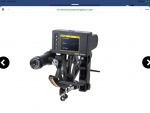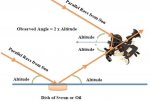Gary Fox
N/A
This is a modified new-build Astra IIIB, it is in production. No consultation of tables is needed, or even a pen and paper, but you need to choose your body and time.
You check the index error and enter it into the computer, followed by the name of the planet.
Then you use like a normal sextant, bring it down to the horizon and swing to check you are vertical.
Now it gets interesting, the light button has been converted, and you press it.
The computer in the sextant will immediately give you a LOP on the screen!
Obviously this raises a few questions, I'm only at RYA Ocean Theory level so don't shoot the messenger, but would you buy one of these?
It drastically reduces the possibilities for mistakes in plotting on paper of course.
Sadly it would take away the jolly fun of peering at confusing columns of 1 millimetre high numbers in a damp book, while being flung about and wondering if your stopwatch is correct..
The robustness of the electronics is unknown, but we don't usually drop sextants anyway..personally I can definitely see them catching on, although I haven't checked the price because I can't afford one..
drop sextants anyway..personally I can definitely see them catching on, although I haven't checked the price because I can't afford one..
You check the index error and enter it into the computer, followed by the name of the planet.
Then you use like a normal sextant, bring it down to the horizon and swing to check you are vertical.
Now it gets interesting, the light button has been converted, and you press it.
The computer in the sextant will immediately give you a LOP on the screen!
Obviously this raises a few questions, I'm only at RYA Ocean Theory level so don't shoot the messenger, but would you buy one of these?
It drastically reduces the possibilities for mistakes in plotting on paper of course.
Sadly it would take away the jolly fun of peering at confusing columns of 1 millimetre high numbers in a damp book, while being flung about and wondering if your stopwatch is correct..
The robustness of the electronics is unknown, but we don't usually
 drop sextants anyway..personally I can definitely see them catching on, although I haven't checked the price because I can't afford one..
drop sextants anyway..personally I can definitely see them catching on, although I haven't checked the price because I can't afford one..
Last edited:

